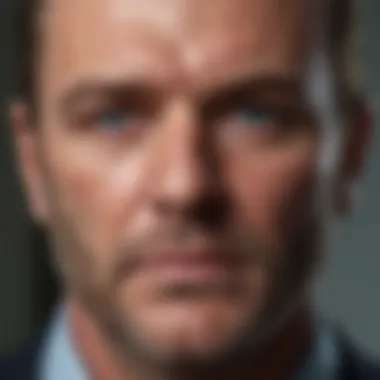Exploring Ray Donovan on Hulu: A Comprehensive Analysis


Intro
The series Ray Donovan stands out as a remarkable exploration of personal struggle, familial loyalty, and moral ambiguity. Available on Hulu, it has garnered a substantial following since its premiere in 2013. The show combines elements of drama and crime, creating a tapestry that reflects both the grit of Los Angeles and the complexity of its characters. With a unique narrative and a focus on emotional depth, Ray Donovan invites the audience to explore the darker aspects of life and human relationships.
Overview of the Entertainment, TV Show, or Film discussed
Background information about the entertainment piece or production being reviewed
Ray Donovan was created by Ann Biderman, who served as the showrunner during its initial seasons. The series was produced by Showtime, a network known for its commitment to high-quality programming. It gained a reputation for its writing and strong performances, particularly from the lead actor, Liev Schreiber, who portrays the titular character. The series ended after seven successful seasons, leaving a legacy that continues to resonate with viewers.
Brief synopsis of the plot or storyline
The plot centers around Ray Donovan, a fixer for a high-profile law firm in Los Angeles. His job involves helping wealthy clients navigate personal crises while remaining largely invisible. However, as Ray manages the messy lives of others, he struggles with his own inner demons and complicated family dynamics. The show dives deep into themes of betrayal, redemption, and the search for identity.
Key details about the creators, directors, actors, or showrunners
The lead, Liev Schreiber, received critical acclaim for his portrayal of Ray, bringing a complex mix of toughness and vulnerability to the character. Other significant cast members include Jon Voight, who plays Ray's estranged father, Mickey, and Eddie Marsan as Ray's brother, Terry. Directors such as Allen Coulter and David Hollander contributed to shaping the show's aesthetic and storytelling style. The collaboration between these talented individuals played a significant role in the show's success.
Analysis and Critique
Evaluation of the performance, direction, writing, cinematography, or other such aspects
The series is notable for the high-quality performances from its cast, especially Liev Schreiber. His ability to convey Ray's struggles is commendable. The direction is skillful, with a focus on both intimate character moments and broader narrative arcs that keep viewers engaged. The writing consistently presents well-developed characters and dialogue that feels authentic to their experiences.
The cinematography complements the storytelling. The mood is often dark, aligning with the show's themes. Views of Los Angeles, typically seen in a glamorous light, are portrayed in a more gritty and realistic manner.
Comparison to similar works or previous seasons/episodes
Compared to other contemporary dramas, Ray Donovan shares similarities with shows like Breaking Bad and The Sopranos, where morally ambiguous characters navigate their complex lives. However, while those shows often emphasize crime and violence, Ray Donovan focuses on the emotional toll of its character's actions. The evolution from its initial seasons to the latter ones shows notable development in character arcs and narrative complexity.
Identification of themes, tones, or stylistic choices
Ray Donovan explores several themes, including family loyalty, identity, and the consequences of one's choices. The tone is often somber, reflecting the internal struggles of its characters. Its style blends realism with moments of tension, creating a layered viewing experience.
Episode/Scene Breakdown
Detailed breakdown of notable scenes, events, or developments in the entertainment piece
Notable episodes highlight critical moments in Ray's life, such as the return of his father, Mickey, which sets off a chain of events that profoundly affect the entire family. This reunion illustrates the difficult dynamics within the Donovan family, showcasing their unresolved issues.
Highlighting key moments, twists, or character arcs
Particularly impactful scenes include moments when Ray's protective instincts clash with his desire for personal freedom. The internal conflict he faces is palpable and presents a compelling thread throughout the series. Episodes where Ray confronts his past significantly shape his character, leading to moments of both vulnerability and strength.
Analysis of the impact of specific scenes on the overall narrative
The climax of various seasons often revolves around significant confrontations that propel character development and relationships. The choices made during these pivotal scenes ripple through the series, underscoring the consequences of Ray's decisions on both himself and his family.
Audience Reception and Ratings
Compilation of critical and audience responses from various sources
Ray Donovan has received generally favorable reviews from critics and audiences alike. The performance of Liev Schreiber often receives praise, highlighting his ability to embody a complex character. Rotten Tomatoes indicates a solid rating among both critics and viewers, signaling a broad appreciation.
Mention of viewer ratings, box office performance, or viewership statistics


The series maintained steady viewer ratings throughout its run. While raw numbers fluctuate season to season, the overall trend indicates a loyal fanbase engaged with the story and characters. Episodes often sparked discussions online, reflecting viewer investment in the unfolding drama.
Comparison of different ratings or opinions to gauge consensus
Critical consensus highlights the show as a strong entry in the television landscape, drawing comparisons to other respected series. Despite some critiques regarding its pacing in later seasons, the majority of opinions acknowledge the series' strengths, particularly in character development and thematic depth.
Recommendations and Epilogue
Personal recommendations for fans, casual viewers, or specific demographics
For fans of character-driven dramas, Ray Donovan is a must-watch. Viewers who appreciate complex storytelling, emotional depth, and intricate character development will find much to enjoy.
Summarization of the key points discussed in the article
In summary, Ray Donovan serves as a compelling examination of moral ambiguity and family dynamics. With its strong performances, thoughtful writing, and meticulous direction, it remains relevant in the conversation about impactful television.
Final thoughts on the entertainment piece and its significance in the industry
As a significant part of the television landscape, Ray Donovan leaves a legacy of well-crafted narrative and profound character exploration. Its exploration of themes such as identity and the personal struggles of its protagonist resonate with audiences, ensuring it will be discussed and appreciated long after its conclusion.
Prelude to Ray Donovan
The series Ray Donovan presents a deep exploration into not just an individual’s life but also a broader commentary on complex family dynamics and the intricacies of personal morality. This article begins its examination of Ray Donovan by establishing essential context in understanding its narrative form and character arc. The series, while a fictional account, mirrors realities many face, making it a significant point of study for both enthusiasts and scholars.
In examining this series, we highlight how its themes resonate with viewers and provoke thought. From the moment it was first aired, it grew to become much more than mere entertainment. It invites viewers to dissect themes such as family loyalty, redemption, and the often blurry line of morality prevailing in modern society. Understanding these facets creates a solid foundation for subsequent sections that delve deeper into the narrative structure, characterization, thematic depth, and production aspects that have influenced its legacy.
Overview of the Series
Ray Donovan debuted in October 2013 on Showtime and quickly captured the interest of audiences with its provocative storytelling. The narrative centers on Ray Donovan, a professional "fixer" for a high-profile law firm in Los Angeles. He is tasked with handling the messes of the rich and famous, often resorting to morally ambiguous methods to protect his clients.
As the series progresses, viewers learn of Ray’s troubled past, complex relationship with his family, and his struggle with his own demons. The writing balances intense drama with moments of levity, exploring not only the external conflicts Ray faces but also his internal battles against guilt and familial obligations. As each season unfolds, the layers of Ray’s character and his struggles are revealed, creating deep emotional engagement.
The series is marked by its strong performances, particularly by Liev Schreiber in the leading role. His portrayal of Ray Donovan presents a character that is both relatable and deeply flawed, making the narrative all the more compelling.
Reception and Legacy
Upon its release, Ray Donovan received critical acclaim, praised for its narrative depth and character development. The series quickly garnered a dedicated fan base and was nominated for multiple awards, encompassing categories such as drama series, actor, and writing.
Despite mixed reviews in some seasons, it maintained a loyal audience throughout its run, culminating in seven successful seasons by 2020. Many critics noted how Ray Donovan paved the way for similar shows, blending traditional family drama with crime thriller elements.
"Ray Donovan manages to capture the duality of human nature, inviting us to witness a man dedicated to fixing others, while struggling to fix himself."
The response to the series highlights its place in the television landscape. It not only served to explore the inner workings of a family under strain, but also opened discussions about the moral gray areas individuals navigate in their lives. The legacy it leaves indicates a significant impact on modern television narrative structures, influencing subsequent series that delve into complex character portrayals and ethical dilemmas.
Plot Synopsis
Understanding the plot synopsis of Ray Donovan is crucial for grasping the overall essence of the series. This section will outline the key narrative arcs and character developments that take place throughout the show, emphasizing how these elements contribute to the series’ depth and appeal.
Season-by-Season Breakdown
Ray Donovan spans seven seasons, each structured with distinct arcs that deepen the viewer's understanding of the characters and their relationships. The series begins with Ray Donovan, portrayed by Liev Schreiber, who is a fixer for a prominent law firm in Los Angeles. The initial season sets the stage for Ray's dual life, balancing his professional responsibilities with personal demons, primarily related to his family.
In the first season, viewers witness Ray's struggles as he tries to manage both his job and his family's issues, wrapped up in personal traumas from his past. As the seasons progress, this intricate tapestry of character relationships and conflicts evolves. Each season introduces new challenges and deeper insights into the characters’ psyche.
The second season delves into Ray's remorse and the repercussions of his actions. The plot becomes increasingly complex as it incorporates topics such as loyalty and betrayal.


Subsequent seasons continue to unveil layers of the characters’ moral ambiguities, notably Ray's father, Mickey Donovan, portrayed by Jon Voight. Mickey’s unpredictable nature adds tension, bringing more depth to Ray’s character as he navigates familial expectations against his professional life.
By the final season, the stakes reach an emotional peak, forcing Ray to confront unresolved issues. This culmination reveals how much the characters have evolved, shaped by their experiences and choices made throughout the series.
Major Arcs and Themes
Ray Donovan presents several recurring arcs and themes that resonate with viewers:
- Family Dynamics: The Donovan family is central to the series. Each member, from Ray to his siblings and father, presents unique struggles. The exploration of loyalty, betrayal, and complex relationships offers a rich narrative landscape.
- Moral Ambiguity: The show dives into the gray areas of morality, highlighting how characters often operate in a world where right and wrong are not easily defined. This ambiguity challenges viewers’ perspectives on justice.
- Identity and Redemption: Throughout the series, Ray’s journey showcases his struggle with identity and the quest for redemption. He grapples with his past while trying to create a future for himself and his family.
Character Analysis
The character analysis section of this article holds great significance as it delves into the multi-layered personalities within "Ray Donovan." Understanding characters is crucial to grasp the series' depth. Each character not only propels the narrative forward but also embodies larger themes such as loyalty, betrayal, and the quest for redemption.
Analyzing characters provides readers valuable insights into their motivations and relationships. This enhances the viewing experience and brings additional context to various plot developments. Recognizing the strengths and flaws of characters leads to a deeper appreciation of the storytelling and its complex nature.
Ray Donovan: A Complex Protagonist
Ray Donovan, portrayed by Liev Schreiber, stands as a compelling and intricate protagonist. From the outset, his character exudes a rough exterior paired with an undeniable sense of duty to his family. Ray operates within the shadows of a morally ambiguous world, often forced to navigate through the mess he encounters as a fixer in Los Angeles. His professional life often clashes with personal dilemmas that reveal his vulnerabilities.
A notable aspect of Ray's character is his struggle with emotional repression. He encounters trauma from a troubling childhood, which is essential in understanding his actions and relationships. His complex psyche makes him relatable to viewers who may have experienced their own battles with family connections or existential crises.
Some fans and critics often discuss Ray's duality: as someone who is both a protector and a destroyer. This internal conflict drives many of the series' most poignant moments, leading to situations where he must make crushing choices. As viewers journey through his narrative, they witness not only his strengths but also the repercussions of his flaws.
Supporting Characters' Contributions
The supporting characters in "Ray Donovan" are pivotal to the narrative's richness and complexity. Each character plays unique roles that contribute to the overall themes and character development. For instance, characters like Abby Donovan and Mickey Donovan represent conflicting influences in Ray's life, pushing him into deeper introspection.
Abby, Ray's wife, serves as a grounding force yet often faces her own struggles within their marriage. This dynamic adds depth, revealing how familial ties can be both a source of stability and turmoil. On the other hand, Mickey, Ray's estranged father, embodies chaos and unpredictability. Their tumultuous relationship highlights themes of loyalty and betrayal, showing how family can impact personal identity.
The series also introduces characters like Lena, who provide further layers to Ray's character. Their interactions often reflect broader societal issues, enriching the story and enhancing the overall character arcs.
In summary, the supporting cast does not merely fill space on screen; they serve as catalysts for Ray's growth and moments of crisis. Their contributions make the narrative more engaging and reflect the interconnectedness of human relationships.
Thematic Exploration
In examining Ray Donovan, the thematic exploration reveals the series' deeper intentions and messages. This aspect is crucial because it enables viewers to grasp the complex layers of storytelling that underpin the narrative. Analyzing themes allows us to uncover how the creators address universal issues that resonate with many. Particularly, themes such as family dynamics, morality, and the concept of the American Dream give insight into the characters' motivations and the societal commentary embedded in the show.
Family Dynamics and Conflict
Family dynamics are central to Ray Donovan. The interactions within Ray's family highlight the intricate relationships colored by loyalty, betrayal, and expectations. Ray's work as a fixer often clashes with his familial obligations. He struggles to maintain a balance between his demanding profession and his roles as a husband and father. Each family member contributes to the overarching narrative of conflict, revealing the personal battles they each face.
The consistent tension between Ray and his father, Mickey Donovan, portrays a complex relationship marked by unresolved issues and emotional trauma. Mickey's reappearance in Ray's life ignites old wounds and challenges the fragile stability Ray has built. The ongoing struggle between duty and desire within the Donovan family draws viewers into a relatable world, making it clear that familial ties can both uplift and suffocate.
Morality and Redemption
Morality is another critical theme in Ray Donovan. Throughout the series, characters grapple with their definitions of right and wrong. Ray operates in a morally ambiguous world, often making choices that blur the lines between legality and ethics. His role as a fixer forces him to navigate the darkest corners of human behavior, raising questions about the moral compromises he makes.
The theme of redemption plays a significant role as well. Characters seek forgiveness and strive to amend their past mistakes. This quest for redemption often leads to personal growth but also reiterates the cyclical nature of their struggles. In moments of vulnerability, the characters confront their demons, making the quest for integrity a compelling part of the narrative.
The American Dream Revisited
Ray Donovan presents a new perspective on the American Dream. While traditionally associated with success and prosperity, the series challenges this notion. The show delves into the darker aspects of ambition and the cost of success. Ray's life is a testament to the American Dream gone awry. Despite his wealth and influence, his personal life remains chaotic, showcasing that financial success does not equate to happiness or fulfillment.
The series highlights the disillusionment faced by many who strive for an idealized version of the American Dream. Ray’s achievements come at a significant emotional cost, prompting viewers to reflect on the true meaning of success. By revisiting this concept, Ray Donovan prompts a thoughtful discussion about the societal pressures that drive individuals and the often-hidden toll of pursuing dreams that may ultimately lead to despair.


Production Details
Production details are critical in shaping the overall experience of a television series. They encompass various facets, from the narrative's creation to the visual storytelling that defines the series. For Ray Donovan, these details reveal much about the show's intentions, the breadth of its storytelling, and its place within the broader television landscape.
Behind the Scenes
The behind-the-scenes aspect of Ray Donovan provides significant insight into the creative process. The show was developed by Ann Biderman and has seen contributions from various directors, writers, and producers. David Hollander served as the showrunner for several seasons and is vital in maintaining the series' identity and tone.
The collaborative efforts among the production team are apparent. Each episode takes a considerable amount of planning to ensure consistency in storytelling. For instance, casting choices had a profound impact on character portrayal, with Liev Schreiber's performance as Ray Donovan being crucial to the series' success. His nuanced interpretation brought layers to the character and earned him numerous accolades.
Moreover, set design and location choices contribute significantly to the atmosphere of the series. Filming primarily in Los Angeles provides a unique backdrop that enhances the narrative. The gritty realism of the city contrasts with the high-stakes world that Ray navigates, adding depth to the storytelling. Decisions regarding costumes and props reflect the characters' socio-economic standings and personalities, creating a believable environment for the audience.
Cinematography and Directing Choices
Cinematography in Ray Donovan is more than just capturing scenes; it is about crafting a visual narrative that complements the story. The series boasts a distinctive style characterized by dynamic camera movements and thoughtful framing. Director of Photography, G. Scott D. Williams, constructed a visual language that enhances the emotional weight of scenes.
In terms of directing, the series employed various directors throughout its run, such as Allen Coulter and Philip Noyce, whose styles contributed to varying tones in different story arcs. The directors focused on close-up shots during moments of intense emotion, immersing the audience into the characters' psyche. On the other hand, wider shots illustrate the characters' isolation amidst the chaos of their lives, reinforcing central themes of loneliness and conflict.
The careful use of lighting also plays a vital role. High contrast and shadow create tension and underscore the moral ambiguity pervasive in the series. Overall, the combination of talented directors and skilled cinematography helps weave a more compelling narrative, engaging the audience not just through the story but through how it is shown.
"Good production shapes how viewers perceive a show. It determines not just what they see, but often how they feel about it."
Understanding the production details of Ray Donovan allows viewers to appreciate the intricate layers that make the series resonate. It highlights the importance of teamwork and the artistic choices that mold the final product, enriching the viewing experience.
Cultural Impact
The cultural impact of Ray Donovan is a vital aspect that cannot be overlooked in this exploration of the series. This topic sheds light on how the show resonated not only with audiences but also influenced the broader landscape of television storytelling. Through its richly layered characters and intricate plots, Ray Donovan carved out a space for itself, creating dialogues around complex themes such as masculinity, family, and morality. These discussions extend beyond mere entertainment, prompting reflections among viewers that make the series a significant cultural artifact.
Influence on Contemporary Television
Ray Donovan significantly impacted contemporary television, setting new standards for drama series. It exemplifies a trend where shows focus on morally ambiguous protagonists, compelling viewers to engage with characters that reflect real-life complexities. Ray's struggle as a fixer for the rich and powerful intersects with personal trauma, blurring lines between hero and anti-hero. This narrative choice influenced several subsequent series, creating a ripple effect across the genre.
A few notable influences include:
- Character Depth: The show encourages deeper character development, which has become a hallmark of successful dramas today.
- Realism and Grit: With its raw portrayal of family dysfunction and personal crises, Ray Donovan contributes to the ongoing trend of realistic storytelling.
- Complex Narratives: The multilayered plotlines seen in Ray Donovan inspired imitators to craft stories that demand viewer engagement on multiple levels.
Reception Among Critics and Audiences
The reception of Ray Donovan among critics and audiences highlights its importance in television history. Critics lauded the series for its writing, performances, and direction. Liev Schreiber’s portrayal of the titular character received particular acclaim, establishing him as a formidable presence in contemporary drama.
Critics noted:
- The show's ability to explore dark themes while maintaining a compelling narrative arc.
- The exceptional supporting cast, which included actors like Jon Voight, who brought rich and nuanced performances maintaining the viewer's interest.
Audiences also responded favorably, as reflected in user ratings on platforms like Reddit and audience reviews on sites like Wikipedia. The passionate fanbase engaged in discussions that often analyzed character motivations and thematic elements, further solidifying its impact in pop culture. The series sparked conversations that went beyond entertainment, addressing societal issues and personal dilemmas, thus ensuring its place in viewers' minds long after the series concluded.
"Ray Donovan not only entertains but invites a deeper conversation about the human condition. It stands as a testament to how far television can push narratives that are both bold and relevant."
In summary, the cultural impact of Ray Donovan is profound. The influence on contemporary television norms and the mixed reception from both critics and viewers contribute to its notable legacy. By breaking new ground in storytelling and character depth, Ray Donovan remains a pivotal touchstone within the modern television landscape.
The End
The conclusion of this article serves as an important summation of the multifaceted layers embedded in Ray Donovan. It encapsulates the key insights gained from analyzing the series, emphasizing its complex narrative and rich character development. Addressing the factors contributing to its lasting impact on both viewers and the television industry, this section highlights how Ray Donovan not only entertains but also spurs critical thought regarding morality, family, and identity.
Final Thoughts on Ray Donovan's Journey
Ray Donovan concludes with a mix of triumph and tragedy, encapsulating the essence of its protagonist's tumultuous journey. The series finale leaves viewers reflecting on how far Ray has come and the burdens he continues to carry. His struggles, including his difficult relationship with family and his efforts to forge a sense of normalcy, resonate with viewers on a personal level. The writing and direction maintain a coherence while allowing for emotional depth, reflecting the show's commitment to character-driven storytelling. Ultimately, Ray's journey serves as a lens through which the audience can examine their own lives, decisions, and the complexities of familial ties.
Future of the Franchise
The future of Ray Donovan remains a topic of speculation among fans and critics alike. While the series has concluded, there have been discussions surrounding potential spin-offs or revivals. The series was known for its intricate plots, compelling characters, and a strong foundation that could support further exploration in a different format. In particular, the character arcs of supporting figures, such as Mickey Donovan or Abby Donovan, offer fertile ground for new narratives. The level of engagement from its existing fanbase suggests that attempts to revisit the Ray Donovan universe could generate significant interest. Maintaining a connection with heartfelt storytelling, while exploring new angles and character developments, would be essential for any future endeavors.





